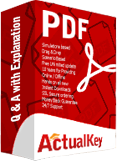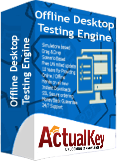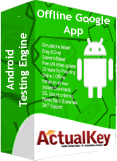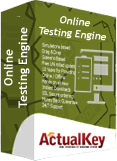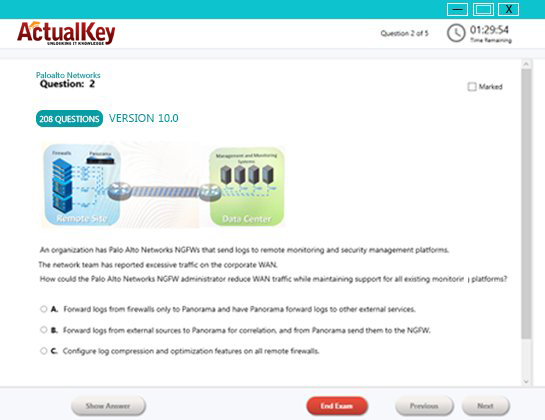Limited Time 30% Discount Offer Use Code - off30
Actualkey Prepration Latest 70-536 : Microsoft .NET Framework 2.0-Application Development Foundation Questions and Answers PDF's, Verified Answers via Experts - Pass Your Exam For Sure and instant Downloads - "Money Back Guarantee".
| Vendor | Microsoft |
| Certification | MCTS |
| Exam Code | 70-536 |
| Title | Microsoft .NET Framework 2.0-Application Development Foundation |
| No Of Questions | 456 |
| Last Updated | September 16,2024 |
| Product Type | Q & A with Explanation |
| Bundel Pack Included | PDF + Offline / Andriod Testing Engine and Simulator |
70-536
TS: Microsoft .NET Framework - Application Development Foundation
About this Exam
This Technology Specialist (TS) exam, Exam 70-536: TS: Microsoft .NET Framework, Application Development Foundation, became available in March 2006. This exam is available in English, French, German, Japanese, and Chinese (Simplified). Exam 70-536 is designed to measure your knowledge of .NET development fundamentals and is not tied to a particular version of .NET. Since the exam is now applicable to both Microsoft .NET Framework 2.0 and Microsoft .NET Framework 3.5 certification tracks, we have changed the name of the exam. Formerly TS: Microsoft .NET Framework 2.0 – Application Development Foundation, Exam 70-536 is now called TS: Microsoft .NET Framework, Application Development Foundation. If you are a .NET 2.0 developer, you do not need to learn .NET 3.5 to pass Exam 70-536; conversely, if you are a .NET 3.5 developer, you do not need to review .NET 2.0 to pass the exam.
Audience Profile
Candidates for this exam work on a team in a medium-sized or large development environment that uses Microsoft Visual Studio .NET 2003 Enterprise Developer, Microsoft Visual Studio 2005, or Microsoft Visual Studio 2008. Candidates should have at least two to three years of experience developing Web-based, Windows-based, or distributed applications by using the Microsoft .NET Framework 1.0, the .NET Framework 1.1, the .NET Framework 2.0, or the .NET Framework 3.5. Candidates should have a working knowledge of Microsoft Visual Studio 2005 or Visual Studio 2008.
Credit Toward Certification
Exam 70-536: TS: Microsoft .NET Framework - Application Development Foundation: counts as credit toward the following certification(s):
* Microsoft Certified Certified Technology Specialist (MCTS): .NET Framework 2.0 Web Applications
* Microsoft Certified Certified Technology Specialist (MCTS): .NET Framework 2.0 Windows Applications
* Microsoft Certified Certified Technology Specialist (MCTS): .NET Framework 2.0 Distributed Applications
* Microsoft Certified Certified Technology Specialist (MCTS): .NET Framework 3.5, Windows Presentation Foundation Applications
* Microsoft Certified Certified Technology Specialist (MCTS): .NET Framework 3.5, Windows Communication Foundation Applications
* Microsoft Certified Certified Technology Specialist (MCTS): .NET Framework 3.5, Windows Workflow Foundation Applications
* Microsoft Certified Certified Technology Specialist (MCTS): .NET Framework 3.5, Windows Forms Applications
* Microsoft Certified Certified Technology Specialist (MCTS): .NET Framework 3.5, ADO.NET Applications
* Microsoft Certified Certified Technology Specialist (MCTS): .NET Framework 3.5, ASP.NET Applications
This Training will cover
This exam measures your ability to accomplish the technical tasks listed below. The percentages indicate the relative weight of each major topic area on the exam.
Developing applications that use system types and collections (15 percent)
* Manage data in a .NET Framework application by using .NET Framework system types.
* May include but is not limited to: Value types; Nullable type; Reference types; Attributes; Generic types; Exception classes; Boxing and UnBoxing ; TypeForwardedToAttribute class
* Manage a group of associated data in a .NET Framework application by using collections.
* May include but is not limited to: ArrayList class; Collection interfaces; Iterators; Hashtable class; CollectionBase class and ReadOnlyCollectionBase class; DictionaryBase class and DictionaryEntry class; Comparer class; Queue class; SortedList class; BitArray class; Stack class
* Improve type safety and application performance in a .NET Framework application by using generic collections.
* May include but is not limited to: Collection.Generic interfaces; Generic Dictionary; Generic Comparer class and Generic EqualityComparer class; Generic KeyValuePair structure; Generic List class, Generic List.Enumerator structure, and Generic SortedList class; Generic Queue class and Generic Queue.Enumerator structure; Generic SortedDictionary class; Generic LinkedList; Generic Stack class and Generic Stack.Enumerator structure
* Manage data in a .NET Framework application by using specialized collections.
* May include but is not limited to: Specialized String classes; Specialized Dictionary; Named collections; CollectionsUtil; BitVector32 structure and BitVector32.Section structure
* Implement .NET Framework interfaces to cause components to comply with standard contracts.
* May include but is not limited to: IComparable interface; IDisposable interface; IConvertible interface; ICloneable interface; IEquatable interface; IFormattable interface
* Control interactions between .NET Framework application components by using events and delegates.
* May include but is not limited to: Delegate class; EventArgs class; EventHandler delegates
Implementing service processes, threading, and application domains in a .NET Framework application (11 percent)
* Implement, install, and control a service.
* May include but is not limited to: Inherit from ServiceBase class; ServiceController class and ServiceControllerPermission class; ServiceInstaller and ServiceProcessInstaller class; SessionChangeDescription structure and SessionChangeReason enumeration
* Develop multithreaded .NET applications.
* May include but is not limited to: Thread class; ThreadPool class; ThreadStart delegate, ParameterizedThreadStart delegate, and SynchronizationContext class; Timeout class, Timer class, TimerCallback delegate, WaitCallback delegate, WaitHandle class, and WaitOrTimerCallback delegate; ThreadExceptionEventArgs class and ThreadExceptionEventHanlder class; ThreadState enumeration and ThreadPriority enumeration; ReaderWriterLock class; AutoResetEvent class and ManualResetEvent class; IAsyncResult interface and ICancelableAsyncResult interface (refer System Namespace); EventWaitHandle class, RegisterWaitHandle class, SendOrPostCallback delegate and IOCompletionCallback delegate; Interlocked class, NativeOverlapped structure and Overlapped class; ExecutionContext class, HostExecutionContext class, HostExecutionContextManager class, and ContextCallback delegate; LockCookie structure, Monitor class, Mutex class, and Semaphore class
* Create a unit of isolation for common language runtime within a .NET Framework application by using application domains.
* May include but is not limited to: Create an application domain; Unload an application domain; Configure an application domain; Retrieve setup information from an application domain; Load assemblies into an application domain
Embedding configuration, diagnostic, management, and installation features into a .NET Framework application (14 percent)
* Embed configuration management functionality into a .NET Framework application.
* May include but is not limited to: Configuration class and ConfigurationManager class; ConfigurationSettings class, ConfigurationElement class, ConfigurationElementCollection class and ConfigurationElementProperty class; Implement IConfigurationSectionHandler interface; ConfigurationSection class, ConfigurationSectionCollection class, ConfigurationSectionGroup class and ConfigurationSectionGroupCollection class; Implement ISettingsProviderService interface; Implement IApplicationSettingsProvider interface; ConfigurationValidationBase class; Implement IConfigurationSystem interface
* Create a custom Microsoft Windows Installer for .NET components by using the System.Configuration.Install namespace, and configure .NET Framework applications by using configuration files, environment variables, and the .NET Framework Configuration tool (Mscorcfg.msc).
* May include but is not limited to: Installer class; Configure which runtime version a .NET Framework application should use; Configure where the runtime should search for an assembly; Configure the location of an assembly and which version of the assembly to use; Direct the runtime to use the DEVPATH environment variable when searching for assemblies; AssemblyInstaller class; ComponentInstaller class; Configure a .NET Framework application by using the .NET Framework Configuration tool (Mscorcfg.msc); ManagedInstallerClass; InstallContext class; InstallerCollection class; Implement IManagedInstaller interface; InstallEventHandler delegate; Configure concurrent garbage collection; Register remote objects by using configuration files
* Manage an event log by using the System.Diagnostics namespace.
* May include but is not limited to: Write to an event log; Read from an event log; Create a new event log
* Manage system processes and monitor the performance of a .NET application by using the diagnostics functionality of the .NET Framework.
* May include but is not limited to: Get a list of all running processes; Retrieve information about the current process; Get a list of all modules loaded by a process; PerformanceCounter class, PerformanceCounterCategory and CounterCreationData class; Start a process both by using and by not using command-line arguments; StackTrace class; StackFrame class
* Debug and trace a .NET Framework application by using the System.Diagnostics namespace.
* May include but is not limited to: Debug class; Debugger class; Trace class, CorrelationManager class; TraceListener class; TraceSource class; TraceSwitch class; XmlWriterTraceListener class; DelimitedListTraceListener class and EventlogTraceListener class; Debugger attributes
* Embed management information and events into a .NET Framework application.
* May include but is not limited to: Retrieve a collection of Management objects by using the ManagementObjectSearcher class and its derived classes; ManagementQuery class; Subscribe to management events by using the ManagementEventWatcher class
Implementing serialization and input/output functionality in a .NET Framework application (18 percent)
* Serialize or deserialize an object or an object graph by using runtime serialization techniques.
* May include but is not limited to: Serialization interfaces; Serialization attributes; SerializationEntry structure and SerializationInfo class; ObjectManager class; Formatter class, FormatterConverter class, and FormatterServices class; StreamingContext structure
* Control the serialization of an object into XML format by using the System.Xml.Serialization namespace.
* May include but is not limited to: Serialize and deserialize objects into XML format by using the XmlSerializer class; Control serialization by using serialization attributes; Implement XML serialization interfaces to provide custom formatting for XML serialization; Delegates and event handlers provided by the System.Xml.Serialization namespace
* Implement custom serialization formatting by using the Serialization Formatter classes.
* May include but is not limited to: SoapFormatter; BinaryFormatter class
* Access files and folders by using the File System classes.
* May include but is not limited to: File class and FileInfo class; Directory class and DirectoryInfo class; DriveInfo class and DriveType enumeration; FileSystemInfo class and FileSystemWatcher class; Path class; ErrorEventArgs class and ErrorEventHandler delegate; RenamedEventArgs class and RenamedEventHandler delegate
* Manage byte streams by using Stream classes.
* May include but is not limited to: FileStream class; Stream Class (NOT Readers and Writer classes, as they are separate objectives); MemoryStream class; BufferedStream class
* Manage .NET Framework application data by using Reader and Writer classes.
* May include but is not limited to: StringReader class and StringWriter class; TextReader class and TextWriter class; StreamReader class and StreamWriter class; BinaryReader class and BinaryWriter class
* Compress or decompress stream information in a .NET Framework application and improve the security of application data by using isolated storage.
* May include but is not limited to: IsolatedStorageFile class; IsolatedStorageFileStream class; DeflateStream class; GZipStream class
Improving the security of .NET Framework applications by using the .NET Framework security features (20 percent)
* Implement code access security to improve the security of a .NET Framework application.
* May include but is not limited to: SecurityManager class; CodeAccessPermission class; Modify the Code Access Security Policy at machine, user, and enterprise policy level by using the Caspol tool; PermissionSet class, NamedPermissionSet class, and PermissionSetCollection class; Standard Security interfaces
* Implement access control by using the System.Security.AccessControl classes.
* May include but is not limited to: DirectorySecurity class, FileSecurity class, FileSystemSecurity class, and RegistrySecurity class; AccessRule class; AuthorizationRule class and AuthorizationRuleCollection class; CommonAce class, CommonAcl class, CompoundAce class, GeneralAce class, and GeneralAcl class; AuditRule class; MutexSecurity class, ObjectSecurity class, and SemaphoreSecurity class
* Implement a custom authentication scheme by using the System.Security.Authentication classes.
* May include but is not limited to: Authentication algorithms and SSL protocols
* Encrypt, decrypt, and hash data by using the System.Security.Cryptography classes.
* May include but is not limited to: DES class and DESCryptoServiceProvider class; HashAlgorithm class; DSA class and DSACryptoServiceProvider class; SHA1 class and SHA1CryptoServiceProvider class; TripleDES and TripleDESCryptoServiceProvider class; MD5 class and MD5CryptoServiceProvider class; RSA class and RSACryptoServiceProvider class; RandomNumberGenerator class; CryptoStream class; CryptoConfig class; RC2 class and RC2CryptoServiceProvider class; AssymetricAlgorithm class; ProtectedData class and ProtectedMemory class; RijndaelManaged class and RijndaelManagedTransform class; CspParameters class; CryptoAPITransform class; Hash-Based Message Authentication Code (HMAC)
* Control permissions for resources by using the System.Security.Permission classes.
* May include but is not limited to: SecurityPermission class; PrincipalPermission class; FileIOPermission class; StrongNameIdentityPermission class; UIPermission class; UrlIdentityPermission class; PublisherIdentityPermission class; GacIdentityPermission class; FileDialogPermission class; DataProtectionPermission class; EnvironmentPermission class; IUnrestrictedPermission interface; RegistryPermission class; IsolatedStorageFilePermission class; KeyContainerPermission class; ReflectionPermission class; StorePermission class; SiteIdentityPermission class; ZoneIdentityPermission class
* Control code privileges by using System.Security.Policy classes. May include but is not limited to: ApplicationSecurityInfo class and ApplicationSecurityManager class; ApplicationTrust class and ApplicationTrustCollection class; Evidence and PermissionRequestEvidence class; CodeGroup class, FileCodeGroup class, FirstMatchCodeGroup class, NetCodeGroup class, and UnionCodeGroup class; Condition classes; PolicyLevel and PolicyStatement class; IApplicationTrustManager interface, IMembershipCondition interface, and IIdentityPermissionFactory interface
* Access and modify identity information by using the System.Security.Principal classes.
* May include but is not limited to: GenericIdentity class and GenericPrincipal class; WindowsIdentity class and WindowsPricipal class; NTAccount class and SecurityIdentifier class; IIdentity interface and IPrincipal interface; WindowsImpersonationContext class; IdentityReference class and IdentityReferenceCollection class
Implementing interoperability, reflection, and mailing functionality in a .NET Framework application (11 percent)
* Expose COM components to the .NET Framework and .NET Framework components to COM.
* May include but is not limited to: Import a type library as an assembly; Create COM types in managed code; Compile an interop project; Deploy an interop application; Qualify .NET types for interoperation; Apply Interop attributes, such as the ComVisibleAttribute class; Package an assembly for COM; Deploy an application for COM access.
* Call unmanaged DLL functions within a .NET Framework application, and control the marshalling of data in a .NET Framework application.
* May include but is not limited to: Platform Invoke; Create a class to hold DLL functions; Create prototypes in managed code; Call a DLL function; Call a DLL function in special cases, such as passing structures and implementing callback functions; Create a new Exception class and map it to an HRESULT; Default marshalling behavior; Marshal data with Platform Invoke; Marshal data with COM Interop; MarshalAsAttribute class and Marshal class
* Implement reflection functionality in a .NET Framework application, and create metadata, Microsoft intermediate language (MSIL), and a PE file by using the System.Reflection.Emit namespace.
* May include but is not limited to: Assembly class; Assembly Attributes; Info classes; Binder class and BindingFlags; MethodBase class and MethodBody class; Builder classes
* Send electronic mail to a Simple Mail Transfer Protocol (SMTP) server for delivery from a .NET Framework application.
* May include but is not limited to: MailMessage class; MailAddress class and MailAddressCollection class; SmtpClient class, SmtpPermission class, and SmtpPermissionAttribute class; Attachment class, AttachmentBase class, and AttachmentCollection class; SmtpException class, SmtpFailedReceipientException class, and SmtpFailedReceipientsException class; SendCompletedEventHandler delegate; LinkedResource class and LinkedResourceCollection class; AlternateView class and AlternateViewCollection class
Implementing globalization, drawing, and text manipulation functionality in a .NET Framework application (11 percent)
Format data based on culture information.
* May include but is not limited to: Access culture and region information within a .NET Framework application; Format date and time values based on the culture; Format number values based on the culture; Perform culture-sensitive string comparison; Build a custom culture class based on existing culture and region classes.
* Enhance the user interface of a .NET Framework application by using the System.Drawing namespace.
* May include but is not limited to: Enhance the user interface of a .NET Framework application by using brushes, pens, colors, and fonts; Enhance the user interface of a .NET Framework application by using graphics, images, bitmaps, and icons; Enhance the user interface of a .NET Framework application by using shapes and sizes.
* Enhance the text handling capabilities of a .NET Framework application, and search, modify, and control text within a .NET Framework application by using regular expressions.
* May include but is not limited to: StringBuilder class; Regex class; Match class and MatchCollection class; Group class and GroupCollection class; Encode text by using Encoding classes.; Decode text by using Decoding classes.; Capture class and CaptureCollection class
I Got My Success Due To Actualkey 70-536 Bundle Pack Actualkey experts I got passed in the 70-536 exam without any worries at all, these exam material products gave me the reason to relax.
Budi Saptarmat
Yahoo! Got Successfully Through The 70-536 Exam Passing Exam is not a easy thanks to Acutalkey.com for providing me actual 70-536 Microsoft .NET Framework 2.0-Application Development Foundation training with there included the Offline and Android simulators helps me success
Melinda
70-536 Exam Best Preparation I have been preparing for 70-536 Microsoft .NET Framework 2.0-Application Development Foundation, I was not sure that I'll be able to pass because of the fact that I am not a good student however;Actualkey.com provided me best and simple exam training pdf's and I passed. I now recommend everyone
Antonio Moreno
Actualkey.com 70-536 Offline Simulator is Best My choice to select Actualkey.com and go for the preparation 70-536 Microsoft .NET Framework 2.0-Application Development Foundation, because I got the short way with the easy way
Liliane Meichner
Actualkey.com 70-536 Exam PDF"s passed with in a week 70-536 exam pdf's that's amazing
James Wilson
Microsoft - RELATED EXAMS
Designing a Database Server Infrastructure by Using Microsoft SQL Server 2005
Questions: 92 Questions | September 16, 2024
Optimizing and Maintaining a Database Administration Solution by Using SQL Server 2005
Questions: 215 | September 16, 2024
UPGRADE: MCDBA Skills to MCITP Database Administrator by Using Microsoft SQL Server 2005
Questions: 186 Questions | September 16, 2024
Microsoft .NET Framework 2.0 - Windows-Based Client Development
Questions: 245 Questions | September 16, 2024
Microsoft .NET Framework 2.0 - Distributed Application Development
Questions: 144 | September 16, 2024
Microsoft .NET Framework 2.0-Application Development Foundation
Questions: 456 | September 16, 2024
Designing and Developing Web-Based Applications by Using the Microsoft .NET Framework
Questions: 74 | September 16, 2024
Designing and Developing Windows-Based Applications by Using the Microsoft .NET Framework
Questions: 72 Questions | September 16, 2024
Designing and Developing Enterprise Applications by Using the Microsoft .NET Framework
Questions: 86 | September 16, 2024
UPGRADE: MCAD Skills to MCPD Web Developer by Using the Microsoft .NET Framework
Questions: 584 | September 16, 2024
UPGRADE: MCAD Skills to MCPD Windows Developer by Using the Microsoft .NET Framework
Questions: 559 | September 16, 2024
UPGRADE: MCSD Microsoft .NET Skills to MCPD Enterprise Application Developer: Part 1
Questions: 609 | September 16, 2024
UPGRADE: MCSD Microsoft .NET Skills to MCPD Enterprise Application Developer: Part 2
Questions: 168 | September 16, 2024
TS: Deploying and Maintaining Windows Vista Client and 2007 Microsoft Office System Desktops
Questions: 92 | September 16, 2024
Windows Server 2008 Applications Infrastructure, Configuring
Questions: 494 | September 16, 2024
TS: Upgrading from Windows Server 2003 MCSA to, Windows Server 2008, Technology Specializations
Questions: 576 | September 16, 2024
Designing a Microsoft Office Enterprise Project Management (EPM) Solution
Questions: 50 Questions | September 16, 2024
Customizing Portal Solutions with Microsoft SharePoint Products and Technologies
Questions: 75 | September 16, 2024
Deploying Business Desktops with Microsoft Windows Server 2003 and Microsoft Office 2003
Questions: 53 | September 16, 2024
Implementing and Administering Security in a Microsoft Windows Server 2003 Network
Questions: 288 | September 16, 2024
Designing, Deploying, and Managing a Network Solution for a Small- and Medium-Sized Business
Questions: 204 | September 16, 2024
Supporting Users and Troubleshooting a Microsoft Windows XP Operating System
Questions: 114 | September 16, 2024
TS: Microsoft SQL Server 2008, Business Intelligence Development and Maintenance
Questions: 399 | September 16, 2024
PRO: Designing, Optimizing and Maintaining a Database Administrative Solution Using Microsoft SQL Server 2008
Questions: 189 | September 16, 2024
Developing E-Business Solutions Using Microsoft BizTalk Server 2004
Questions: 40 | September 16, 2024
Developing Microsoft Office Solutions Using XML with Office Professional Edition 2003
Questions: 50 | September 16, 2024
Planning and Building a Messaging and Collaboration Environment Using Microsoft Office System and Microsoft Windows Server 2003
Questions: 61 | September 16, 2024
TS: Microsoft .NET Framework 3.5, ADO.NET Application Development
Questions: 287 | September 16, 2024
TS: Microsoft .NET Framework 3.5, ASP.NET Application Development
Questions: 364 | September 16, 2024
TS: Microsoft Office Project Server 2007, Managing Projects
Questions: 145 | September 16, 2024
TS: Microsoft .NET Framework 3.5, Windows Forms Application Development
Questions: 48 | September 16, 2024
Upgrade: Transition Your MCITP SQL Server 2005 DBA to MCITP SQL Server 2008
Questions: 98 | September 16, 2024
Pro: Designing and Deploying Messaging Solutions with Microsoft Exchange Server 2010
Questions: 379 | July 1, 2024
Pro: Designing and Developing ASP.NET Applications Using the Microsoft .NET Framework 3.5
Questions: 281 | September 16, 2024
TS: Microsoft SQL Server 2008, Implementation and Maintenance
Questions: 328 | September 16, 2024
Microsoft System Center Configuration Manager 2007,Configuring
Questions: 184 | September 16, 2024
PRO: Designing and Developing Microsoft SharePoint 2010 Applications
Questions: 200 | September 16, 2024
Upgrading to Windows 7 MCITP Enterprise Desktop Support Technician
Questions: 50 | September 16, 2024
TS: Windows Applications Development with Microsoft .NET Framework 4
Questions: 278 | September 16, 2024
TS: Windows Communication Foundation Development with Microsoft .NET Framework 4
Questions: 473 | September 16, 2024
TS: Web Applications Development with Microsoft .NET Framework 4
Questions: 405 | September 16, 2024
Pro: Designing and Developing Web Applications Using Microsoft .NET Framework 4
Questions: 288 | September 16, 2024
TS: Developing Business Process and Integration Solutions by Using Microsoft BizTalk Server 2010
Questions: 100 | September 16, 2024
Designing and Providing Microsoft Volume Licensing Solutions to Small and Medium Organizations
Questions: 232 | September 16, 2024
TS: Forefront Protection for Endpoints and Applications, Configuring
Questions: 105 | September 16, 2024
Upgrade: Transition Your MCITP SQL Server 2005 DBD to MCITP SQL Server 2008 DBD
Questions: 154 | July 1, 2024
Pro: Windows Server 2008 R2, Virtualization Administrator
Questions: 176 | September 16, 2024
PRO: Designing Database Solutions and Data Access Using Microsoft SQL Server 2008
Questions: 183 | July 1, 2024
Managing and Maintaining a Microsoft Windows Server 2003 Environment
Questions: 450 | July 1, 2024
Implementing Data Models and Reports with Microsoft SQL Server 2012
Questions: 330 | July 1, 2024
Implementing a Data Warehouse with Microsoft SQL Server 2012
Questions: 322 | September 16, 2024
Transition Your MCTS on SQL Server 2008 to MCSA: SQL Server 2012, Part 2
Questions: 300 | September 16, 2024
Configuring and Deploying a Private Cloud with System Center 2012
Questions: 462 | September 16, 2024
Monitoring and Operating a Private Cloud with System Center 2012
Questions: 457 | September 16, 2024
Administering and Deploying System Center 2012 Configuration Manager
Questions: 208 | September 16, 2024
Microsoft Dynamics AX 2012 Process Manufacturing Production and Logistics
Questions: 149 | July 1, 2024
Advanced Metro style App Development using HTML5 and JavaScript
Questions: 225 | September 16, 2024
Transition Your MCTS on SQL Server 2008 to MCSA: SQL Server 2012, Part 1
Questions: 230 | September 16, 2024
Transition Your MCITP: Database Administrator 2008 or MCITP: Database Developer 2008 to MCSE: Data Platform
Questions: 261 | September 16, 2024
Transition Your MCITP: Business Intelligence Developer 2008 to MCSE: Business Intelligence
Questions: 132 | September 16, 2024
Designing Database Solutions for Microsoft SQL Server 2012
Questions: 231 | September 16, 2024
Designing Business Intelligence Solutions with Microsoft SQL Server 2012 Exam
Questions: 314 | September 16, 2024
Microsoft Programming in HTML5 with JavaScript and CSS3 Exam
Questions: 342 | September 16, 2024
Delivering Continuous Value with Visual Studio 2012 Application Lifecycle Management
Questions: 219 | July 1, 2024
Enterprise Voice & Online Services with Microsoft Lync Server 2013
Questions: 158 | September 16, 2024
Developing Microsoft SharePoint Server 2013 Core Solutions
Questions: 181 | September 16, 2024
Upgrade your MCPD: Web Developer 4 to MCSD: Web Applications
Questions: 229 | September 16, 2024
Essentials of Developing Windows Metro style Apps using C#
Questions: 168 | September 16, 2024
Server Virtualization with Windows Server Hyper-V and System Center
Questions: 149 | September 16, 2024
Essentials of Developing Windows Metro style Apps using HTML5 and JavaScript
Questions: 166 | September 16, 2024
TS: Windows Small Business Server 2011 Standard, Configuring
Questions: 55 | September 16, 2024
TS: MS Internet Security & Acceleration Server 2006, Configuring
Questions: 80 | September 16, 2024
TS: Microsoft System Center Operations Manager 2007, Configuring
Questions: 94 | September 16, 2024
TS: System Center Virtual Machine Manager 2008, Configuring
Questions: 45 | September 16, 2024
PRO: Designing a Business Intelligence Infrastructure Using Microsoft SQL Server 2008
Questions: 115 | September 16, 2024
Upgrade: Transition Your MCITP SQL Server 2005 BI Developer to MCITP SQL Server 2008 BI Developer
Questions: 203 | September 16, 2024
Recertification for MCSD: Application Lifecycle Management
Questions: 292 | September 16, 2024
TS: Microsoft .NET Framework 3.5 Windows Presentation Foundation Application Development
Questions: 101 | September 16, 2024
TS: Microsoft .NET Framework 3.5 - Windows Communication Foundation
Questions: 270 | September 16, 2024
TS: Visual Studio Team Foundation Server 2010, Administration
Questions: 72 | September 16, 2024
Pro: Designing and Developing Windows Applications Using Microsoft .NET Framework 4
Questions: 239 | September 16, 2024
TS: Microsoft Windows SharePoint Services 3.0 Application Development
Questions: 109 | September 16, 2024
Upgrade: Transition your MCPD Enterprise Application Developer Skills to MCPD Enterprise Application Developer 3.5, Part 1
Questions: 153 | September 16, 2024
UPGRADE: Transition your MCPD Enterprise Application Developer Skills to MCPD Enterprise Application Developer 3.5, Part 2
Questions: 123 | September 16, 2024
TS: System Center Data Protection Manager 2007, Configuring
Questions: 74 | September 16, 2024
Designing and Providing Microsoft Volume Licensing Solutions to Large Organizations
Questions: 126 | September 16, 2024
TS: Designing, Assessing, and Optimizing Software Asset Management (SAM)
Questions: 85 | September 16, 2024
MS Office Communication Server 2007-U.C Voice Specialization
Questions: 174 | September 16, 2024
Microsoft Office Communications Server 2007 R2 U.C. Voice Specialization
Questions: 101 | September 16, 2024
Windows Server 2008 Hosted Environments, Configuring and Managing
Questions: 75 | September 16, 2024
Designing and Providing Microsoft Volume Licensing Solutions to Large Organisations
Questions: 104 | September 16, 2024
Pro: Designing and Developing Windows Applications Using the Microsoft .NET Framework 3.5
Questions: 105 | July 1, 2024
Pro: Designing and Developing Enterprise Applications Using the Microsoft .NET Framework 3.5
Questions: 152 | September 16, 2024
Universal Windows Platform – App Data, Services, and Coding Patterns (beta)
Questions: 47 | September 16, 2024
Universal Windows Platform – App Architecture and UX/UI (beta)
Questions: 76 | September 16, 2024
Microsoft Dynamics AX 2012 R3 CU8 Installation and Configuration
Questions: 48 | July 1, 2024
Designing and Deploying Microsoft Exchange Server 2016 Exam
Questions: 166 | September 16, 2024
Introduction to Programming Using Block-Based Languages (Touch Develop)
Questions: 72 | July 1, 2024
Development, Extensions and Deployment for Microsoft Dynamics 365 for Finance and Operations
Questions: 90 | July 1, 2024
Financial Management in Microsoft Dynamics 365 for Finance and Operations
Questions: 73 | July 1, 2024
Designing and Providing Microsoft Licensing Solutions to Large Organizations
Questions: 195 | July 1, 2024
Distribution and Trade in Microsoft Dynamics 365 for Finance and Operations
Questions: 93 | July 1, 2024
Administering Microsoft System Center Configuration Manager and Cloud Services Integration
Questions: 150 | July 1, 2024
Microsoft Configuring and Operating a Hybrid Cloud with Microsoft Azure Stack Exam
Questions: 99 | July 1, 2024
Microsoft Azure Solutions Architect Certification Transition Exam
Questions: 393 | July 1, 2024
Outlook 2016: Core Communication, Collaboration and Email Skills
Questions: 35 | July 1, 2024
Microsoft Developing Solutions for Microsoft Azure Exam
Questions: 170 / 6 Case Study | July 1, 2024
Designing and Implementing a Data Science Solution on Azure Exam
Questions: 442 | December 3, 2024
Microsoft 365 Teamwork Administrator Certification Transition Exam
Questions: 120 | July 1, 2024
Microsoft Messaging Administrator Certification Transition Exam
Questions: 155 | July 1, 2024
Microsoft Excel 2016: Core Data Analysis, Manipulation, and Presentation Exam
Questions: 35 | November 8, 2024
Microsoft Word 2016: Core Document Creation, Collaboration and Communication Exam
Questions: 35 | November 8, 2024
Microsoft Dynamics 365 for Finance and Operations, Supply Chain Management Exam
Questions: 394 | November 25, 2024
Microsoft Dynamics 365 for Finance and Operations, Manufacturing Exam
Questions: 207 | November 8, 2024
Building Applications and Solutions with Microsoft 365 Core Services Exam
Questions: 242 | July 1, 2024
Microsoft Dynamics 365: Finance and Operations Apps Solution Architect Exam
Questions: 295 | February 18, 2025
Planning and Administering Microsoft Azure for SAP Workloads Exam
Questions: 652 | July 1, 2024
Microsoft Dynamics 365: Finance and Operations Apps Developer Exam
Questions: 283 | February 21, 2025
Administering Relational Databases on Microsoft Azure (beta) Exam
Questions: 341 | December 13, 2024
Microsoft Dynamics 365 Business Central Functional Consultant (beta) Exam
Questions: 279 | November 8, 2024
Microsoft Power Platform Functional Consultant (beta) Exam
Questions: 289 | February 18, 2025
Configuring and Operating a Hybrid Cloud with Microsoft Azure Stack Hub Exam
Questions: 176 | July 1, 2024
Microsoft Dynamics 365 Fundamentals Customer Engagement Apps (CRM) (beta) Exam
Questions: 159 | October 12, 2024
Microsoft Dynamics 365 Fundamentals Finance and Operations Apps (ERP) Exam
Questions: 146 | February 14, 2025
Configuring and Operating Windows Virtual Desktop on Microsoft Azure Exam
Questions: 207 | February 20, 2025
Designing and Implementing a Microsoft Azure AI Solution (beta) Exam
Questions: 321 | December 2, 2024
Designing and Implementing Microsoft Azure Networking Solutions Exam
Questions: 281 | January 22, 2025
Designing Microsoft Azure Infrastructure Solutions (beta) Exam
Questions: 324 | January 16, 2025
Designing and Implementing Cloud-Native Applications Using Microsoft Azure Cosmos DB (beta) Exam
Questions: 140 | January 28, 2025
Configuring Windows Server Hybrid Advanced Services (beta) Exam
Questions: 157 | October 22, 2024
Administering Windows Server Hybrid Core Infrastructure (beta) Exam
Questions: 334 | September 2, 2024
Microsoft Designing and Implementing Enterprise-Scale Analytics Solutions Using Microsoft Azure and Microsoft Power BI Exam
Questions: 160 | July 1, 2024
Microsoft Dynamics 365 Supply Chain Management Functional Consultant Expert Exam
Questions: 152 | August 20, 2024
Implementing Analytics Solutions Using Microsoft Fabric Exam
Questions: 117 | February 21, 2025
Implementing Data Engineering Solutions Using Microsoft Fabric Exam
Questions: 67 | January 9, 2025
Exams code, certifications, vendor or keywords
![]()
Copyright © 2009 - 2025 Actualkey. All rights reserved.

